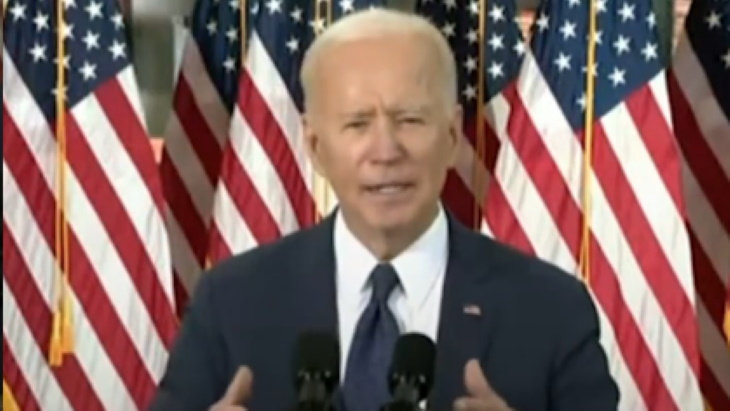Speaking at a carpenters' union training centre in Pittsburgh, Pennsylvania, Biden said: "Today, I'm proposing a plan for the nation that rewards work, not just rewards wealth. It builds a fair economy that gives everybody a chance to succeed, and it's going to create the strongest, most resilient, innovative economy in the world. It's not a plan that tinkers around the edges. It's a once-in-a generation investment in America, unlike anything we've seen or done since we built the Interstate Highway System and the Space Race decades ago."
A White House fact sheet outlining the American Jobs Plan notes that after decades of disinvestment, US roads, bridges and water systems are "crumbling". It says the electricity grid is also vulnerable to catastrophic outages. "It has never been more important for us to invest in strengthening our infrastructure and competitiveness, and in creating the good-paying, union jobs of the future," it says.
Biden's American Jobs Plan anticipates investing about 1% of GDP annually over eight years to upgrade the USA's infrastructure, revitalise manufacturing, invest in basic research and science, shore up supply chains, and solidify the country's care infrastructure. In total, the plan will invest about USD2 trillion this decade.
"As the recent Texas power outages demonstrated, our aging electric grid needs urgent modernisation," the fact sheet says. It notes a US Department of Energy study found that power outages cost the US economy up to USD70 billion annually. "The President's plan will create a more resilient grid, lower energy bills for middle class Americans, improve air quality and public health outcomes, and create good jobs, with a choice to join a union, on the path to achieving 100% carbon-free electricity by 2035."
Cleaner electricity
In his plan, Biden calls on Congress to invest USD100 billion to build a more resilient electricity transmission system and to spur jobs modernising power generation and delivering clean electricity. He proposes a 10-year extension and phase down of an expanded direct-pay investment tax credit and production tax credit for clean energy generation and storage. The plan also aims to mobilise private investment to modernise the power sector. An Energy Efficiency and Clean Electricity Standard will also be established to cut electricity bills and electricity pollution, increasing competition in the market, incentivising more efficient use of existing infrastructure, and continuing to leverage the carbon pollution-free energy provided by existing sources "like nuclear and hydropower".
Biden also calls on Congress to invest USD35 billion in "the full range of solutions needed to achieve technology breakthroughs that address the climate crisis and position America as the global leader in clean energy technology and clean energy jobs". The plan will invest USD15 billion in demonstration projects for climate R&D priorities, including utility-scale energy storage, carbon capture and storage, hydrogen, advanced nuclear, rare earth element separations, floating offshore wind, biofuel/bioproducts, quantum computing, and electric vehicles.
To meet Biden's goals of achieving net-zero emissions by 2050, the USA will need more electric vehicles, charging ports, and electric heat pumps for residential heating and commercial buildings. The plan calls on Congress to enable the manufacture of those cars, ports, pumps and clean materials, as well as critical technologies like advanced nuclear reactors and fuel, in the USA through a USD46 billion investment in federal buying power.
The President is proposing a USD174 billion investment in electric vehicles (EVs). His plan will "enable carmakers to spur domestic supply chains from raw materials to parts, retool factories to compete globally, and support American workers to make batteries and EVs". It will also give consumers point-of-sale rebates and tax incentives to buy US-made EVs. A national network of 500,000 EV charging points will be established by 2030 under the plan.
Alongside the American Jobs Plan, Biden is proposing to fix the corporate tax code so that it incentivises job creation and investment in the USA, stops "unfair and wasteful profit shifting to tax havens", and ensures that large corporations are paying their fair share.
"What I'm proposing is a one-time capital investment of roughly USD2 trillion in America's future, spread largely over eight years," Biden said. "It will generate historic job growth, historic economic growth, help businesses to compete internationally, create more revenue as well. They are among the highest-value investments we can make in the nation - investing in our infrastructure.
"But put it another way, failing to make these investments adds to our debt and effectively puts our children at a disadvantage relative to our competitors. That's what crumbling infrastructure does. And our infrastructure is crumbling."
Industry welcomes plan
The Nuclear Innovation Alliance (NIA) welcomed Biden's announcement of the American Jobs Plan.
NIA's Executive Director Judi Greenwald said: "Among broader energy sector investments, the plan would support the development and demonstration of advanced nuclear energy, a clean energy technology critical not only for meeting mid-century climate goals but for ensuring a more resilient energy infrastructure in the decades to come."
She added, "The technology-inclusive American Jobs Plan specifically incorporates advanced nuclear energy as eligible for funding for demonstration projects, building on ongoing activities by the Department of Energy and industry to demonstrate the commercial viability of next generation nuclear power."
In a joint statement, American Nuclear Society President Mary Lou Dunzik-Gougar and CEO Craig Piercy said, "The nuclear energy industry supports high-paying jobs that last decades and a growing world market for small modular and advanced reactor designs promise job growth for communities across the US."







_55401.png)
_23009.jpg)






